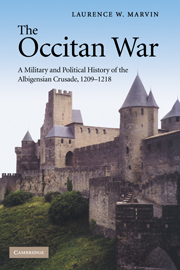Book contents
- Frontmatter
- Contents
- List of abbreviations
- List of maps and plans
- Translation of names and places; calculation of distances
- Preface and acknowledgments
- Maps and plans
- 1 Introduction
- 2 The campaign of 1209
- 3 Simon of Montfort and the campaign of 1210
- 4 The campaigns of 1211
- 5 Drawing the noose: the campaign year of 1212
- 6 The athlete of Christ triumphs: late 1212 through Muret 1213
- 7 From Muret to Casseneuil: September 1213 to December 1214
- 8 The two councils and Prince Louis's crusade, January–December 1215
- 9 The southern counter-attack begins: February 1216 to fall 1217
- 10 The second siege of Toulouse and end of the chief crusader: 1217–1218
- Aftermath and epilogue
- Select bibliography
- Index
8 - The two councils and Prince Louis's crusade, January–December 1215
Published online by Cambridge University Press: 18 July 2009
- Frontmatter
- Contents
- List of abbreviations
- List of maps and plans
- Translation of names and places; calculation of distances
- Preface and acknowledgments
- Maps and plans
- 1 Introduction
- 2 The campaign of 1209
- 3 Simon of Montfort and the campaign of 1210
- 4 The campaigns of 1211
- 5 Drawing the noose: the campaign year of 1212
- 6 The athlete of Christ triumphs: late 1212 through Muret 1213
- 7 From Muret to Casseneuil: September 1213 to December 1214
- 8 The two councils and Prince Louis's crusade, January–December 1215
- 9 The southern counter-attack begins: February 1216 to fall 1217
- 10 The second siege of Toulouse and end of the chief crusader: 1217–1218
- Aftermath and epilogue
- Select bibliography
- Index
Summary
The year 1215 was to be the least militarily active period between 1209 and 1218 as the people of Occitania waited to see if and how their world would change. From a political standpoint several important things happened during the year. Simon of Montfort spent most of it within a hair's breadth of gaining the church's sanction for his conquests. Though not quite as definitive as Montfort and many southern prelates hoped, the January 1215 Council of Montpellier made him the heir apparent to the Count of Toulouse's lands in the south. Final disposal of the lands, however, depended on the pope, who called what is widely regarded as one of the most important councils of the entire Middle Ages, commonly referred to as Fourth Lateran. Because a sizeable chunk of the council concerned events in Occitania, the main narrative sources of the crusade cover some aspects of the council in fair detail. The events of the Fourth Lateran Council brought out the quills of the Anonymous and William of Puylaurens, neither of whom left an account of what happened in 1214. Finally, during 1215 the chief crusader had to sit by as Prince Louis redeemed his vow and paraded in the south on his own crusade.
THE COUNCIL OF MONTPELLIER, JANUARY 1215
On 7 December 1214 one of the papal legates sent out letters announcing a council to be held at Montpellier, beginning on 8 January 1215.
- Type
- Chapter
- Information
- The Occitan WarA Military and Political History of the Albigensian Crusade, 1209–1218, pp. 217 - 237Publisher: Cambridge University PressPrint publication year: 2008



